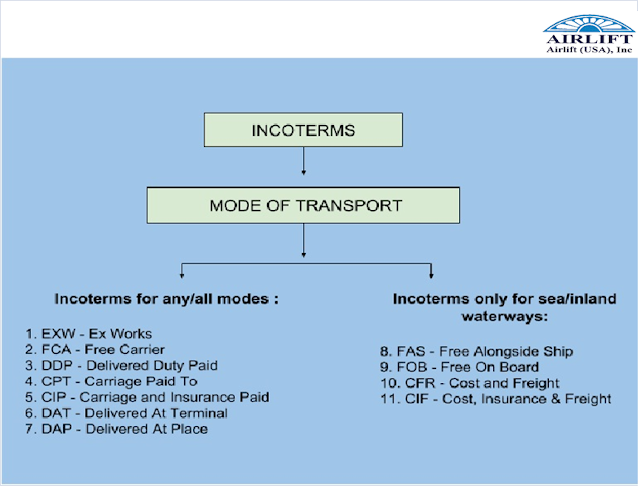INCOTERMS
INCOTERMS 101
Are you an
international trader struggling to understand when to use which INCOTERM?
Are you a new entrant
in the shipping world who just learned about the existence of this acronym, but
don't know what it means yet?
If the answer is yes,
then we have some good news for you! Today all those questions and doubts are
going to be put to rest.
Let's begin with
understanding what exactly are INCOTERMS.
Incoterms or
International Commercial Terms refer to a set of predefined trade terms that
explain the roles and responsibilities of the buyer and the seller in an
international sale contract. They were first published by the International
Chamber of Commerce (ICC) in 1936 to reduce the confusion regarding the
obligations of both the seller and the buyer in the shipping process. By
clearly defining who is responsible for what and up to which point while
shipping freight, these definitions provide clarity to traders and help
facilitate the smooth functioning of the global supply chain.
Why is it important
to know about Incoterms?
Incoterms define how
the costs and risks associated with moving goods across borders will get
divided between both the parties. Failure to employ the right incoterm can
leave either the buyer or the seller with higher financial and legal
responsibilities in comparison to the other party. Not knowing who is
responsible to pay what duty can also result in seizure of goods and cause
unnecessary delays and fines. This can really affect your bottom line and also
render your business conduct as illegal or non-compliant with global trade
rules. To help avoid such circumstances, it's vital for both the parties to
have a thorough understanding of these terms before negotiating a contract.
So what exactly do
these Incoterms determine?
- Who arranges and pays for the transport
- Who arranges and pays for the insurance
- Who handles the export and
import formalities
- Terms of delivery for the
seller
- The point of transfer of
risks and costs from the seller to the buyer
It's important to
note that just because a party arranges for transport or insurance, doesn't
mean it also bears the risk. The point of transfer of risk from the seller
to the buyer differs from Incoterm to Incoterm.
THE CURRENT 11:
In order to keep up
with the changing landscape of international trade, ICC revises Incoterms once
every 10 years. Currently, Incoterms 2010 is the version that's in use.
Before that, Incoterms 2000 was being followed worldwide.
As per Incoterms
2010, there are 11 Incoterms available to help facilitate international trade.
They can be classified into two categories based on the mode of
transport.
Category A -
INCOTERMS FOR ANY MODE OR MODES OF TRANSPORT
The following
Incoterms form a part of this category :
1. EXW - Ex Works
2. FCA - Free Carrier
3. DDP - Delivered
Duty Paid
4. CPT - Carriage
Paid To
5. CIP - Carriage and
Insurance Paid
6. DAT - Delivered At
Terminal
7. DAP - Delivered At
Place
Category B -
INCOTERMS ONLY FOR SEA/INLAND WATERWAYS
These include:
8. FAS - Free
Alongside Ship
9. FOB - Free On
Board
10. CFR - Cost and
Freight
11. CIF - Cost,
Insurance & Freight
With this, you now
know what exactly are Incoterms, their significance and how to classify them.
Don't worry! We're
not winding up this topic here.
We'll be going over
each term individually and explain what it means in the next blog.
See you next week!




ReplyDeleteThis article is very nice as well as very informative.
If you are a roadrunner customer and you are facing problems to set up Roadrunner Email Settings than you can directly contact us on our toll free helpline +1-888-338-6033.
Thanks for sharing such a great and helpful article. We are providing resolution related to Move QuickBooks To New Computer if anyone facing problem related to Quickbooks so you can directly call us at our QuickBooks Online Tech Support Number +1-877-249-9444.
ReplyDeleteThis comment has been removed by the author.
ReplyDeleteChina DDP Shipping Services
ReplyDeleteChina DDP Shipping Services
ReplyDelete